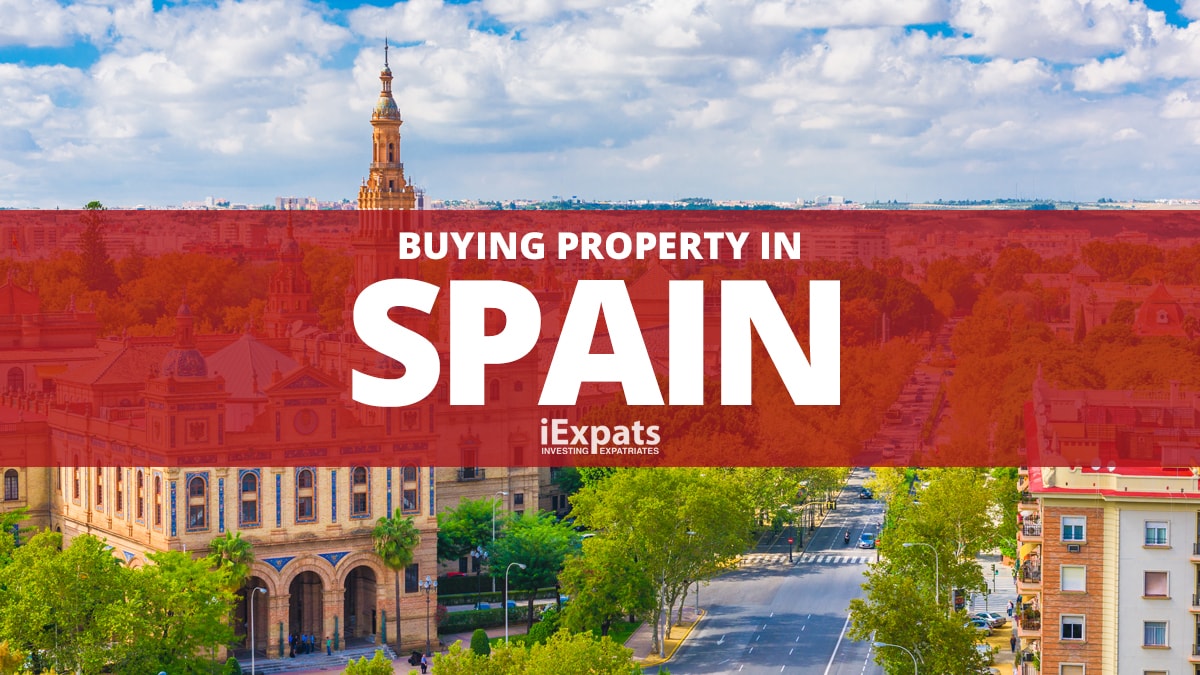British expats’ love affair with property in Spain started in the 70s and we started claiming property in the 80s. In fact, we’ve never really stopped buying property in Spain since.
Who hasn’t suffered a tinge of jealousy while watching A Place In The Sun on TV and longing to switch places with the singles and couples buying property in Spain?
Understandably, British expats seek to move to places with better weather. Spain has been a must-go destination for British expats living overseas for decades.
Even the scare stories about unscrupulous developers pocketing deposits for off-plan housing and then scarpering with the cash haven’t put Brits off.
That’s because buying in Spain can be straightforward and stress-free if you do your homework. But you do have to get the right people to help in the first place.
Table of contents
- Finding Your Spanish Dream Home
- Buying Property In Spain From A Developer
- How To Get A Mortgage For Buying Property In Spain
- Getting ‘Insider’ Info From Expats
- Why You Need An Independent Lawyer
- CGT For Expats And Other Horror Stories
- Registering As A Resident In Spain
- Buying A Property In Spain FAQ
- Related Information
Finding Your Spanish Dream Home
Finding an affordable dream is the first thing on most sunseeker’s minds.
Chances are you already know roughly where you want to live, so it’s a case of keeping an eye out for a suitable property.
Thanks to the internet it’s easy to keep abreast of what’s happening in your chosen location. You can sign up to several Spanish estate agencies in the region you like and also keep an eye on the ‘foreign locations’ pages in UK property portals like Rightmove and Zoopla.
You can also check out developer sites for the area. Buying off-plan means you could negotiate a discount.
International property shows in the UK are an excellent way to meet developers.
TV’s Place in the Sun have regular trade shows in London, Glasgow and Birmingham. They also audition for lucky house hunters for the programme at the shows. So, if you’re deemed ‘TV-friendly’ and your purchase fits their schedule, you may find yourself on the small screen and getting expert help to find your dream property.
The process of buying a property abroad is like buying in the UK.
You find a property you like, put in a bid after getting the house or apartment surveyed and your offer is either accepted or rejected. Negotiations can then start, or you can simply move on until something else comes up.
The main point to check is if you buy with the help of an estate agent or developer, you need to verify their credentials. That means ensuring they are regulated as professionals by a body such as the Association of International Property Professionals (AIPP).
You can find detailed British government Foreign Office advice about buying property in Spain here.
Meanwhile, check out the following for dealing with foreign developers:
Buying Property In Spain From A Developer
The fear of buying a property off-plan from a developer is a realistic one – whether you’re in the UK or Spain.
You need to plan for if the developer could go bust before your apartment is completed and that you lose all your hard-earned cash. To avoid this nightmare scenario there are several steps you can insist on.
Ensure the developer keeps your cash in a client money account which is separate from their business running costs. You can also ask for a bank guarantee declaring you will get your money returned should the apartment not go ahead.
Ask for a clause in the contract which states you will be paid interest if the agreed completion date isn’t met.
Keep notes of all meetings, agreements and payments you have with the developer. Accompany this with photographs of the on-going build. That way, if anything does happen and you must go to court, you already have a nice body of evidence.
How To Get A Mortgage For Buying Property In Spain
Borrowing the money to buy a property in Spain isn’t as easy as taking out a loan in the UK.
Most UK lenders won’t even entertain the idea of lending on an overseas property.
Your best bet is to go to a specialist lender – a company which specialises in lending for expat mortgages. You’ll find plenty of them online.
Due to the additional legal complications of purchasing a foreign property, you will pay a little extra for a specialist mortgage. To get the money, you will need a clean credit history and substantial deposit.
Getting ‘Insider’ Info From Expats
A great way to find out where you intend to live is to rent a property in the neighbourhood for six months to a year.
That way you can find out what it’s actually like to live there before you embark on a big spend.
If this is not possible, you might have to rely an expat to tell you what it’s like moving from the UK to your chosen corner of Spain.
Rather than going to Spain and locating expats to talk to, take a look at some of the expat forums.
There are lots of expat magazines and newspapers across Spain that you can view online to get a feel for the community before you set foot there.
From expat forums though you can ask direct advice about such everyday matters as where the best place to buy meat is, what the parking is like on the development or street, and whether there are any local taxes you don’t know about yet. You’ll probably also want recommendations for a dentist and doctor.
In the meantime, the UK government’s Living in Spain guide can give you a good grounding on what to expect with plenty of tips about visas, healthcare, driving and taking pets abroad.
Why You Need An Independent Lawyer
Don’t spare the expense in hiring an English-speaking lawyer who is independent and qualified in Spain to oversee your purchase.
Make sure they have no business links to an estate agent or developer. That way you can be assured they have yourbest interests at heart.
As a starting point, the local British Embassy, high commission or consulate will have an online list of English-speaking lawyers in Spain as a starting point.
Don’t stop at an independent lawyer, get your own translator and surveyor rather than go with a recommendation from the estate agent or developer.
You can find an approved translator in Spain at the Ministry for Foreign Affairs here.
A surveyor for your region can be found at the Spanish College of Architects web site.
Your lawyer should put all legal documents in writing in Spanish and English to check the property has a clear title. They should always check the legitimacy of the seller too – and before you hand over any cash.
If it’s a new development then double check that the electricity, gas, water is land on and running before you buy so you won’t be charged for connection later.
CGT For Expats And Other Horror Stories

British property owners could stay out of the UK for a complete tax year and avoid capital gains tax, but this is no longer possible.
Expats cannot become UK resident for at least five full tax years to try to avoid CGT on selling buy to let properties or second homes.
HM Revenue & Customs will consider expats as non-resident for income tax if they settle outside the UK for one full tax year, but the minimum is five years for CGT.
Ongoing maintenance and upkeep costs for new developments can mount up. These can be quite costly at times so it’s worth budgeting for them as you go along.
High money transfer costs when changing currency aren’t uncommon. Again, just like with your mortgage, it pays to use a company specialising in overseas money transfer.
If you are buying a listed property in Spain considered ‘rural land’ then double check with the municipal and regional authorities that full planning permission for residential use is in place.
This has led to expat horror stories about having their properties ‘snatched back’ by local authorities because the developer didn’t get permission to build.
Read more about expats paying CGT when selling UK property.
Registering As A Resident In Spain
Due to Brexit, immigration rules are changing for those who plan on staying in Spain for three months or more after December 31, 2020.
The fine detail is still under discussion.
The British government suggests keeping an eye on how talks are progressing by signing up for email alerts on the EU transition web site.
And, in fact, these are still to be decided. It’s advised to keep checking the UK government website for updated information.
Buying A Property In Spain FAQ
Buying a property in Spain is an adventure and many Brits make the move a success.
If you are looking for a dream move to your own place in the sun, here are answers to some of the most asked questions from property hunters.
The state of a country’s property market is always a reflection of its economy in general.
Spain’s economy has improved in recent years, which is reflected in rising property prices.
Before the coronavirus struck, prices were forecast to rise 5% in 2020, boosted by historically low mortgage rates.
The Spanish economy grew by 2% last year, but The Bank of Spain predicts this will shrink to 1.7% in 2020. The European Commission was even less optimistic with a 1.5% forecast.
The most popular destinations for expats are the Costa del Sol and Barcelona. But it’s not only the British who have been buying property in Spain– the French, Germans, Italians, Belgians and Swedes have settled in large numbers, too.
Most regions saw an increase in house prices last year with the biggest rises in the Canary Islands and the Balearics.
The hike in values is nothing like the boom between 1996 and 2007 when foreign buyers watched helpless as prices for coastal properties rocketed by as much as 155%.
The rise was more subdued for inland property, but still hit 117%. The reason for the surge was put down to foreign demand, especially from Brits and the French.
The highest prices are around San Sebastian, on the Bay of Biscay in the Basque region. Next highest are Barcelona and Madrid. Budget to pay between €3,000 to €3,600 a square metre.
According to the latest census figures, Spain has around 760,000 expats. The British government reckons nearly half – 310,000 – are British expats and many are retired in Spain. You can find their homes in the popular east coast resorts around the Mediterranean and the Canary Islands and Balearics.
Related Information
Below is a list of related articles you may find of interest.
